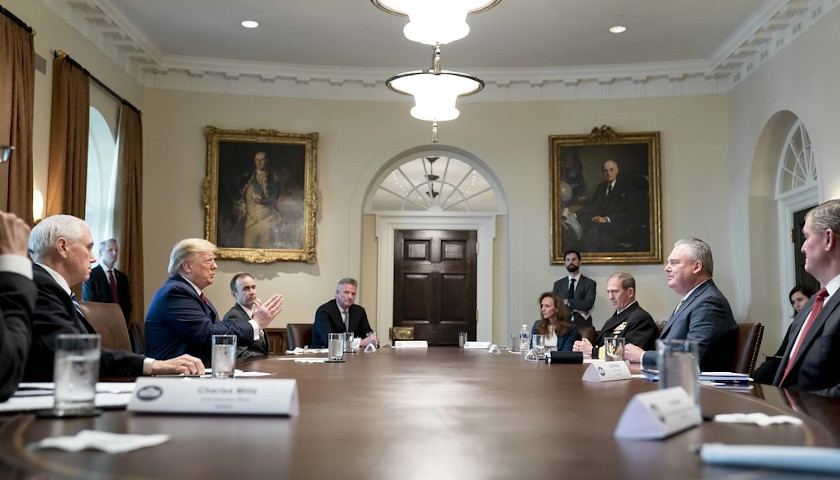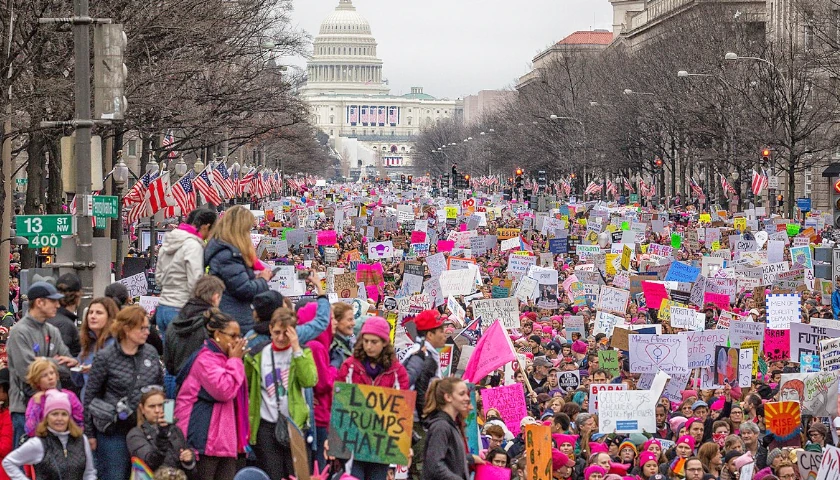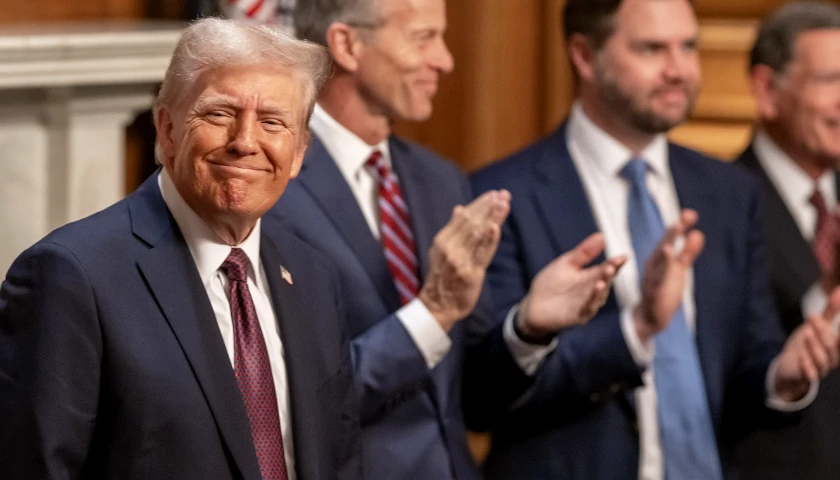by Adam Selene
The Chinese virus is a clarifying agent. Among other things, one can see the choice between republican and progressive government—the rule of the people on the one hand and the rule of experts on the other. President Donald Trump and former Vice President Joe Biden perfectly embody this choice in response to the crisis.
Nowhere is this more evident than in the way the two men approach the expert advice of Dr. Anthony Fauci, director of the National Institute of Allergy and Infectious Disease and member of Trump’s COVID-19 Task Force.
Trump is adamant that he will listen to and consider what Fauci has to say, but in the end he, as the elected president, will determine the right course of action. For Trump, politics is the overarching art: immunology and epidemiology are subordinate sciences. Biden promises the opposite, saying “If I’m elected president, I will always lead the way with science. I will listen to the experts and heed their advice. I will do the opposite of what we’re seeing Donald Trump do every day.”
Who Rules?
This is the choice before us. Are we to be ruled by experts as if they are our guardians simply because they might be smarter than us in specific fields, or are we to rule ourselves?
The supposed legitimacy of the former approach comes from fear. We are told the world is too complex. We need the experts to guide us, protect us, and save us. We need an elite guardian class to rule over us because we cannot make it on our own. But this cowardice makes us nothing more than slaves, not citizens.
The legitimacy of self-rule springs from our love of justice and our virtue. In our republican system, it requires a commitment to the truth that all men are created equal, and to the proposition that the just powers of government are derived by consent. It requires courage, moderation, friendship, and grace. It is these virtues that allow us to live free, apart from the “chains of despotism” as Madison says in Federalist 55.
The rule of expertise is not politics rightly understood; it is management. There is no deliberation involved. Instead, there is only bureaucracy, administration, and a religious—actually, cultish—devotion to what we now call science.
The rule of the people allows for statesmanship and liberty. Though statesmen might not always be “at the helm,” we the people, as the safeguard of our own liberty, can elect representatives with wisdom and prudence or pay the price when we don’t. We evaluate how well they do, discuss, debate, and then decide who should govern through elections.
Expertise Is Not Prudence
The rule of expertise, while on the surface promising intelligent leadership, is incapable of prudent government. The rule of expertise leads to incompetence, strife, and corruption instead of scientific precision and impartiality.
This is because the rule of expertise is built on a weak foundation. People’s faith in “science” is often misplaced. Most of what we call science is really just scientism—the foolish belief that men cease to be men when they put on white lab coats and begin charting numbers and lines. Scientism overstates what men can actually know. Moreover, the rule of expertise stands or falls on the belief that men are basically good and scientists are immune to the unjust desire to rule for their own benefit.
Admittedly, it is hard to convince anyone in the grips of this false religion that there is more to governance than the opinions of (necessarily) flawed experts. The warm embrace of the dream world provides great comfort that somehow the right human beings are in control. Most people will fight to stay asleep in the cave of shadows, insisting that they know the truth.
Regardless, the vast majority of “experts” are useless academics and professional bureaucrats. Their fields of study are full of jargon and credentials that lead to conformity and groupthink. Experts learn early that challenging the authorities in one’s field is risky for one’s career. Whatever thinking is involved quickly devolves into vague, abstract theorizing about ideas that are unable to be proven or disproven and thus do not threaten the ideas of one’s peers or superiors.
Often, what is supposed to be science ends up being just another form of cronyism, and what we call “expertise” ends up being knowledge of otherwise useless jargon and how to navigate a career field. The government bureaucracy that results is incompetent, often harmful, and tyrannical.
This is not to say there are not very smart men whom we can legitimately call experts—men like Dr. Fauci. But even at their best, these experts are incapable of prudence. Their knowledge is specific and precise, limiting their ability to consider circumstances broadly. Their skillset is often highly technical, built on years of experience and careful adherence to established protocols, limiting their ability to consider new solutions. And, besides, they typically confront only one problem a nation faces, not the full spectrum of the problems we must face.
In short, science and expertise can be wonderful things that help us to know what is, but they cannot answer the question of what we ought to do. This is the difference between science and politics. One is about knowing; the other is about acting. Expertise and science are subordinate to the art of politics. Experts make terrible rulers.
Prudence and Common Sense
Those who don’t presume to be experts, on the other hand, tend to be more attuned to actual circumstances. Whereas experts often enjoy the comfort of abstract thinking, regular people are more immediately connected to the harsh realities of life and the consequences of their decisions. A miscalculation might be professionally embarrassing for an expert, if anyone even notices. In real life, a miscalculation hurts one’s business or family.
Likewise, the normal man is often better equipped to consider the highest things. Less enamored of his own knowledge of or power over the world, he tends to rely more on pre-scientific knowledge, or common sense. He tends to be more aware of what he doesn’t actually know, more reliant on conscience, and to have more faith in the divine. In short, normal people tend to be comfortable looking to the heavens for help and guidance.
The American regime is founded on the idea that common citizens with common sense can achieve sensible politics. This can lead to a sort of local statesmanship, often manifested in family, small businesses, and peaceful communities, where people live with the consequences of their actions. Occasionally it leads to statesmanship proper: the ability to look after the wellbeing of the whole nation with prudence, wisdom, and faith.
The Present Moment
If you listen carefully to the White House press conferences on the coronavirus pandemic, you will notice that Trump emphasizes the newness of the problem, the complexity of the circumstances, common sense, community, and action. Expertise has a place, but it is and must remain in a subordinate role. He sees the inherent connection between Easter and getting through this and doesn’t shy away from prayer. His critics, on the other hand, whine about the need to listen to expertise and science, as if these are gods who will save us if we just submit to them.
It is not by happenstance that the choice between republican and progressive government aligns with a choice between a party of people who worship God, promote families, seek to protect babies, care about local business, and respect science in its place, and a party of people who worship “science,” eschew religion, promote abortion, are cosmopolitan, and sneer at traditional families. It should not surprise anyone that in this crisis one party wants local control with federal support and one party wants local submission to federal control. One is the party of the people; one is the party of scientism.
The war against COVID-19 puts the choice between expertise and common sense front and center. Are we to be ruled by statesmen or experts?
As we emerge from this crisis, I predict that we will find the battle lines between the two camps have only hardened and the stakes are higher than ever. But at least things will be clear.
– – –
Adam Selene is the pseudonym of a writer who has studied American political thought and politics.





